Elliot Wang: Unite for peace in the world and Taiwan’s Inclusion in the U.N.

Recent events, notably Russia’s aggression in Ukraine, highlight the disregard autocratic regimes have for global peace. The United Nations (U.N.), a cornerstone of international harmony, must respond resolutely. At the same time, Taiwan’s exclusion from the U.N. demands attention. China’s threats to Taiwan’s democracy and regional stability necessitate collective vigilance. In this interconnected world, crises transcend borders. Taiwan’s strategic importance in trade and technology underscores the need for stability in the Taiwan Strait. However, China’s actions challenge this stability, necessitating a united response. Taiwan’s absence in the U.N., a result of China’s manipulation of Resolution 2758, contradicts U.N. principles. As the upcoming U.N. General Assembly convenes to discuss global solidarity, Taiwan’s inclusion is a timely topic. By embracing inclusivity, the U.N. can tackle shared challenges like the Sustainable Development Goals effectively. Global crises showcase our united strength. Welcoming Taiwan affirms the U.N.’s commitment to peace and resisting authoritarianism. It’s not just inclusion; it’s proof unity conquers adversity. Elliot Wang, Director-General of the Taipei Economic and Cultural Office in Atlanta
Mike Rogers reintroduces bill to withdraw the U.S. from United Nations and WHO
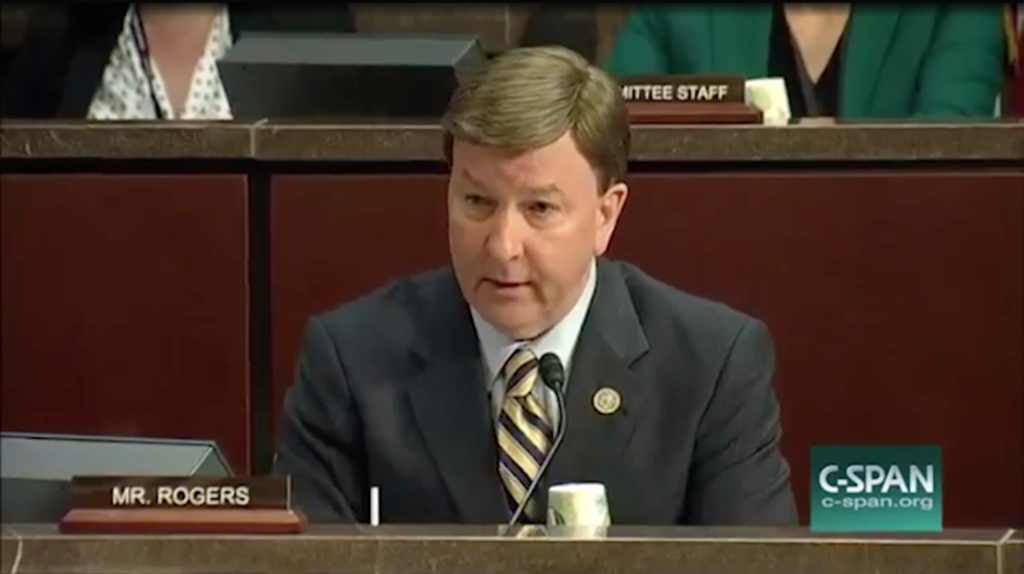
U.S. Rep. Mike Rogers announced he has reintroduced the American Sovereignty Restoration Act of 2022. The legislation would withdraw the United States from the United Nations (UN) and the World Health Organization(WHO). Specifically, the bill would revoke any money given to either organization. Additionally, it would repeal The United Nations Environment Program Participation Act of 1973. Rogers originally introduced the legislation in 2017. Rogers described UN Commissioner Michelle Bachelet as a “puppet” and said the organization was “utterly useless.” “The United Nations has repeatedly proven itself to be an utterly useless organization. The UN’s founding charter states the UN’s mission ‘to reaffirm faith in fundamental human rights, in the dignity and worth of the human person, in the equal rights of men and women and of nations large and small.’ However, the UN High Commissioner for Human Rights Michelle Bachelet has proven herself to be nothing more than a puppet for the Chinese Communist Party – aiding the CCP in playing down the very real and horrifying genocide being carried out against Uyghur’s,” Rogers stated. “It’s unconscionable that China continues to sit on the UN Human Rights Council even as it carries out this disturbing genocide on top of its numerous and daily violations of basic human rights. It’s clear the UN has abandoned the ideals set in its founding charter and that’s why, among many other reasons, I’ve reintroduced legislation to withdraw the United States from the UN,” he continued. Rogers also singled out the WHO for helping China cover up what he called “the origins of COVIDE-19.” “This legislation would also withdraw the United States from the corrupt World Health Organization. The WHO lost all credibility when they chose to put public health second to the Chinese Communist Party by helping the CCP cover up the origins of COVID-19,” Rogers concluded.
The Atlantic Charter: Optimistic leadership in an uncertain world

Imagine your football team is in the first quarter of a game, a couple of star players are sidelined, and the opponent’s offense seems unstoppable. The score is already 28 – 0 when your head coach takes a time-out. He lets his assistants coach up the team while he meets with an architect to design a new stadium to display championship trophies and meets with another head coach to discuss developing a new conference with more efficient rules to increase attendance and enthusiasm for the game. Sound farfetched? Eighty years ago, something like this actually happened – but not on the gridiron. In August 1941, World War II was almost two years old. While Britain was still in the game, her prospects for success were far from certain, with no feeling of inevitable victory. Good news on the battlefront was hard to come by, but inspired by Winston Churchill, the English people continued to maintain the stiff upper lip of optimism. President Franklin Roosevelt couldn’t know that Pearl Harbor was four months away, and American ambivalence about the war in Europe was high. Nevertheless, Roosevelt understood the dangerous world situation and the probable and unavoidable entry of the United States into the conflict. For the first time since Winston Churchill had become prime minister and Roosevelt had become president, these two leaders meet at Placentia Bay, Newfoundland, to discuss the future not only for their respective countries but also for the world.After a series of agenda-less meeting, not only between the two leaders but also among their staffs, they issued a remarkable statement that was later dubbed “The Atlantic Charter.” Perhaps one of the most interesting things about this communique is that it was never really reduced to writing and signed by each country. In fact, it was never ratified by Congress or approved by Parliament. Rather, it was an eight-point idealistic explanation of a post-war agenda to outline to the world at large what the fighting was all about and to anticipate an Allied victory. In 1941 with so many unknowns, the Atlantic Charter expressed an optimism that victory was in sight and gave hope to the nations involved in the conflict. Neither breath-taking hubris nor propaganda ploy, the Atlantic Charter expressed a manifest destiny that the English-speaking people would achieve victory and build a new world based on a unique English worldview. In a nutshell, the Atlantic Charter made it clear that the British and Americans were united against the aggression of the Axis powers. While the United States had not entered the war, the Charter affirmed a solidarity between the two countries and set the stage for American dominance as a world power. The Charter further presented a view that relationships between nation-states would be founded on reciprocal trade agreements emphasizing open markets on equal terms for both the victor and vanquished. This stood in stark contrast to the unfavorable trade arrangements that punished Germany after World War I and precipitated Adolph Hitler’s rise to power. One new principle – perhaps the most controversial – was the right of all peoples to self-determination. This concept was the logical conclusion that since Britain and the United States did not have territorial ambitions and would not support nations using armed conflict to expand their borders, something must happen to nations overrun by the Axis blitz. The clear implication, probably unintended, was that after the war, people within a defined boundary could choose their government, effectively ending colonialism and establishing new countries based on the consent of the governed. The basic tenants of the Atlantic Charter were presented to other Allied nations and generally adopted in principle. The contents were printed on leaflets and dropped over Germany to repudiate the propaganda of any punitive post-war settlement. In Japan, the Charter bolstered anti-American sentiment and was used to show a conspiracy against the insecure nation. Natives under the thumb of colonial powers believed the Charter promoted their rights to independence, thus emboldening a commitment to the Allied cause. One of the most striking features of the Charter was its impact despite having no authority or force of law from ratification by any government. Rather, the Charter was an agreement between two leaders of substantial stature in the world. Its binding impact was a reflection of personal leadership and integrity, indicating that if these two giants made a statement about their goals for a future world order, their credibility gave other countries confidence that the Charter would be implemented. Only great leaders can do things like this. Powerful personalities and bold initiatives characterized both men. In fact, the year before the Atlantic Charter, Roosevelt and Canada’s Prime Minister, Mackenzie King, would complete the Ogdensburg Agreement, which established a mutual defense agreement between the neighboring countries. Like the Atlantic Charter, this agreement was never ratified by any political body but expressed a mutual agreement between strong leaders protecting their countries. To this day, the Ogdensburg Agreement serves as an expression of the mutual defense of Canada and the United States. The Atlantic Charter galvanized the Allies by outlining post-war aims. Its expressed objectives for creating a stable world order were reflected in the creation of the United Nations, but the collective security of that body was thwarted by Soviet ideology, which eschewed any sense of international cooperation and fairness. The Atlantic Charter achieved its near-term objectives by precisely outlining why the allies were committed to the fight. In the long term, it failed to create a structure for nation-states to live in harmony without the threat of territorial ambitions of a neighbor. International organizations work best by providing a loose framework that exalts private property rights and promotes the rule of law. The Atlantic Charter assumed this, but the United Nations became a pawn for the Russians who used principles like self-determination to obtain control over misguided revolutionaries by convincing them communism and not democracy was a counterweight to colonialism. Will Sellers is a 1985 graduate of Hillsdale College and an Associate
Nikki Haley resigns as Donald Trump’s UN Ambassador
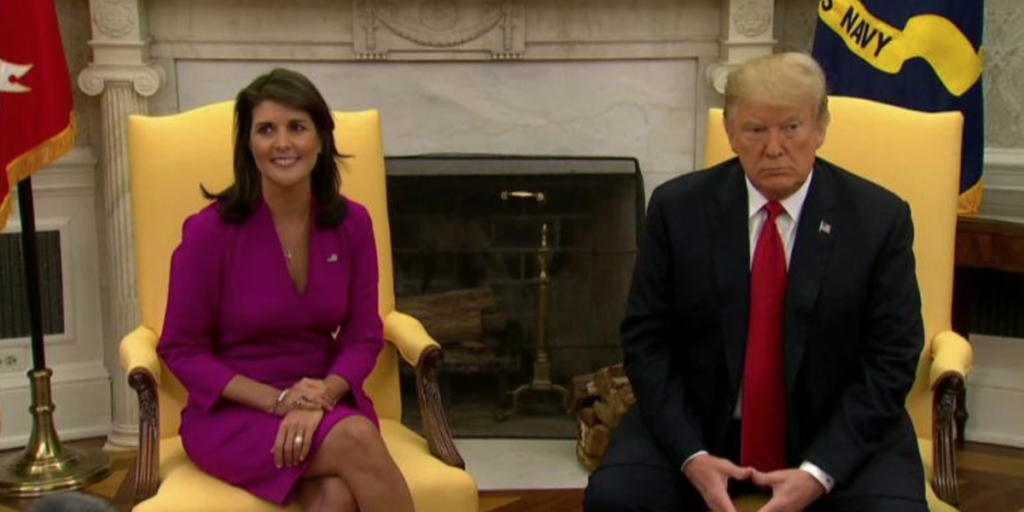
U.N. Ambassador Nikki Haley is leaving the administration at the end of the year, she and President Donald Trump announced Tuesday. She gave no reason for her departure after two years, though there has been speculation she will return to government or politics at some point. “No, I’m not running in 2020” for president, she joked. She said she would be supporting Trump. Haley said she and Trump together had “solved a lot of problems. They spoke in the Oval Office, shortly after word came of her plans to resign. Trump called Haley a “very special” person, adding that she told him six months ago that she might want to take some time off. It’s the latest shake-up in the turbulent Trump administration just weeks before the November midterm elections. Haley’s resignation was a closely guarded secret. Congressional Republicans involved in foreign policy matters and some key U.S. allies did not get advance word from Haley or the White House. Haley, who is speculated to hold aspirations for higher office, said at the White House: “No I’m not running in 2020.” Haley, 46, was appointed to the U.N. post in November 2016 and last month coordinated Trump’s second trip to the United Nations, including his first time chairing the Security Council. A rookie to international politics, the former South Carolina governor was an unusual pick for to be U.N. envoy. “It was a blessing to go into the U.N. every day with body armor,” Haley said, saying her job was to defend America on the world stage. At the U.N., Haley helped spearhead the Trump administration’s efforts to combat what it alleged to be anti-American and anti-Israel actions by the international body. Trump said he was considering many candidates for Haley’s job and that a successor would be named in two to three weeks. Last month Haley wrote an op-ed article in The Washington Post discussing her policy disagreements but also her pride in working for Trump. It came in response to an anonymous essay in The New York Times by a senior administration official that alleged there to be a secret “resistance” effort from the right in Trump’s administration and that there were internal discussions of invoking the 25th amendment to remove him from office. “I proudly serve in this administration, and I enthusiastically support most of its decisions and the direction it is taking the country,” Haley wrote. “But I don’t agree with the president on everything.” The daughter of Indian immigrants, Haley clashed with then-candidate Trump during the 2016 campaign, denouncing “the siren call of the angriest voices” who disrespected America’s immigrants. Trump tweeted that “The people of South Carolina are embarrassed by Nikki Haley.” “Before she was named by Trump to her U.N. post, Haley was elected the first female governor of South Carolina. She was re-elected in 2014. South Carolina Republican Sen. Lindsey Graham, a close Trump ally tweeted that Haley “has a very bright future and will be a key player in both the future of the Republican Party and our nation as a whole for years to come.” As governor, she developed a national reputation as a racial conciliator who led the charge to bring down the Confederate flag at the Statehouse and helped guide the state through one of its darkest moments, the massacre at a black church. Republished with permission from the Associated Press.
U.S. braces for possible cyberattacks after Iran sanctions
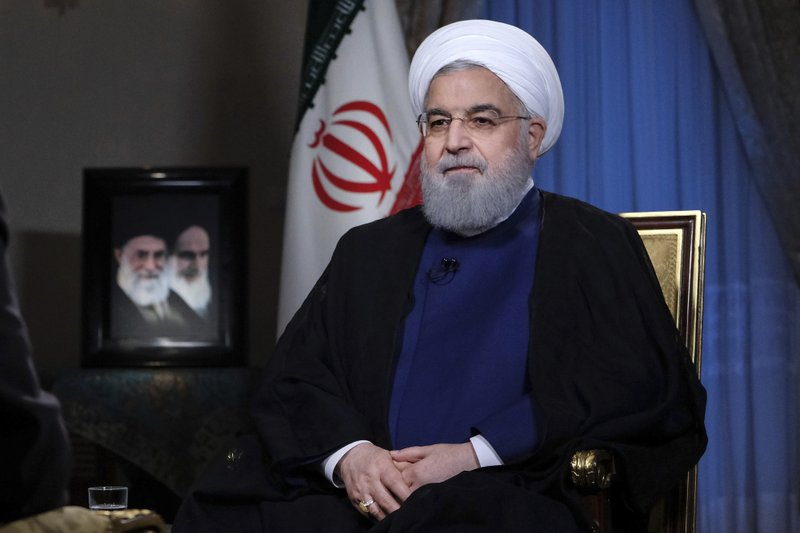
The U.S. is bracing for cyberattacks Iran could launch in retaliation for the re-imposition of sanctions this week by President Donald Trump, cybersecurity and intelligence experts say. Concern over that cyber threat has been rising since May, when Trump pulled out of the 2015 nuclear deal, under which the U.S. and other world powers eased economic sanctions in exchange for curbs on Iran’s nuclear program. The experts say the threat would intensify following Washington’s move Tuesday to re-impose economic restrictions on Tehran. “While we have no specific threats, we have seen an increase in chatter related to Iranian threat activity over the past several weeks,” said Priscilla Moriuchi, director of strategic threat development at Recorded Future, a global real-time cyber threat intelligence company. The Massachusetts-based company predicted back in May that the U.S. withdrawal from the nuclear agreement would provoke a cyber response from the Iranian government within two to four months. U.S. intelligence agencies have singled out Iran as one of the main foreign cyber threats facing America, along with Russia, China and North Korea. A wave of attacks that U.S. authorities blamed on Iran between 2012 and 2014 targeted banks and caused tens of millions of dollars in damage. They also targeted but failed to penetrate critical infrastructure. Iran denies using its cyber capabilities for offensive purposes, and accuses the U.S. of targeting Iran. Several years ago, the top-secret Stuxnet computer virus destroyed centrifuges involved in Iran’s contested nuclear program. Stuxnet, which is widely believed to be an American and Israeli creation, caused thousands of centrifuges at Iran’s Natanz nuclear facility to spin themselves to destruction at the height of the West’s fears over Iran’s program. “The United States has been the most aggressive country in the world in offensive cyber activity and publicly boasted about attacking targets across the world,” said Alireza Miryousefi, spokesman for Iran’s diplomatic mission at the United Nations, contending that Iran’s cyber capabilities are “exclusively for defensive purposes.” Gen. Qassem Soleimani, who heads the elite Quds Force of Iran’s hard-line paramilitary Revolutionary Guard, has sounded more ominous, warning late last month about Iran’s capabilities in “asymmetric war,” a veiled reference to nontraditional warfare that could include cyber attacks. The Trump administration says it re-imposed sanctions on Iran to prevent its aggression — denying it the funds it needs to finance terrorism, its missile program and forces in conflicts in Yemen and Syria. The sanctions restarted Tuesday target U.S. dollar financial transactions, Iran’s automotive sector and the purchase of commercial planes and metals, including gold. Even stronger sanctions targeting Iran’s oil sector and central bank are to be re-imposed in early November. European leaders have expressed deep regret about the U.S. actions. They hit Iran at a time when its unemployment is rising, the country’s currency has collapsed and demonstrators are taking to the streets to protest social issues and labor unrest. Norm Roule, former Iran manager for the office of the Director of National Intelligence, said he thinks Tehran will muster its cyber forces in response. “I think there is a good chance Iran will use cyber, probably not an attack that is so destructive that it would fragment its remaining relationship with Europe, but I just don’t think the Iranians will think there is much cost to doing this,” Roule said. “And it’s a good way to show their capacity to inflict economic cost against the United States.” “Iran’s cyber activities against the world have been the most consequential, costly and aggressive in the history of the internet, more so than Russia. … The Iranians are destructive cyber operators,” Roule said, adding that Iranian hackers have, at times, impersonated Israeli and Western cyber security firm websites to harvest log-in information. The office of Director of National Intelligence Dan Coats declined to comment Tuesday on the likelihood that Iran will answer the sanctions with cyber operations against the U.S. When the U.S. pulled out of the nuclear deal, the FBI issued a warning saying that hackers in Iran “could potentially use a range of computer network operations — from scanning networks for potential vulnerabilities to data-deletion attacks — against U.S.-based networks in response to the U.S. government’s withdrawal” from the nuclear pact. Accenture Security, a global consulting, managing and technology company, also warned Tuesday that the new sanctions would “likely to push that country to intensify state-sponsored cyber threat activities,” particularly if Iran fails to keep its European counterparts committed to the nuclear pact. Josh Ray, the firm’s managing director for cyber defense, said it hasn’t seen any evidence that Iran has launched any new cyber operations, but he said Iran has the capability to do it and has historically operated in a retaliatory manner. “This still remains a highly capable, espionage-related type threat,” Ray said. “Organizations need to take this threat seriously. They need to understand how their business could potentially be impacted.” Recorded Future’s Moriuchi anticipated that businesses most at risk were those victimized in Iranian cyberattacks between 2012 and 2014 — they include banks and financial services, government departments, critical infrastructure providers, and oil and energy. Those cyberattacks cost nearly 50 financial institutions tens of millions of dollars. The repeated attacks disabled bank websites and kept hundreds of thousands of customers from accessing their online accounts. U.S. prosecutors indicted several Iranians, alleging they worked at the behest of the Iranian government. One defendant allegedly targeted the computer systems of the Bowman Dam in Rye, New York. No access was gained, but prosecutors said the breach underscored the potential vulnerabilities of the nation’s critical infrastructure. In March, the Justice Department also announced charges against nine Iranians accused of working at the behest of the Islamic Revolutionary Guard Corps to steal large quantities of academic data from hundreds of universities in the United States and abroad as well as email accounts belonging to employees of government agencies and private companies. Republished with the permission of the Associated Press.
U.N. calls on U.S. to halt separations of migrant families
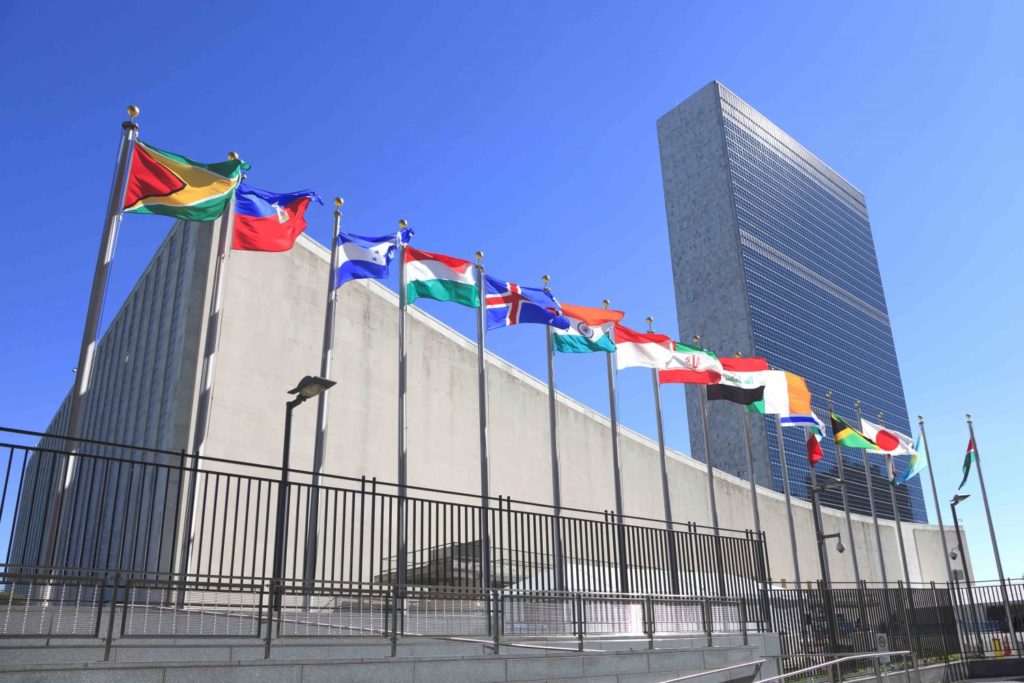
The U.N. human rights office is calling on the Trump administration to “immediately halt” its policy of separating children from their parents after crossing U.S. border with Mexico. Rights office spokeswoman Ravina Shamdasani scolded the U.S. for its “zero tolerance” policy in which some families have been separated after migration across the border. The rights office said in a statement that “children should never be detained for reasons related to their own or their parents’ migration status. Detention is never in the best interests of the child and always constitutes a child rights violation.” Shamdasani told a U.N. briefing Tuesday that the practice of separating families amounted to an “arbitrary and unlawful” interference in family life, calling it a “serious violation” of the rights of children. Republished with the permission of the Associated Press.
Will Davis: AMEXIT — It’s time to ditch the U.N.

“A forum for anti-semitism & anti-americanism.” Florida Senator Marco Rubio, a former presidential candidate, and one of the country’s leading voices on foreign policy had these harsh words for the United Nations in a Tweet back in February. Rubio also questioned the continued funding for an organization that treats America and her allies with such hostility. This followed a general assembly vote 128-9 to condemn the U.S. decision to recognize Jerusalem as the capital of Israel. Now it’s time for Rubio and his GOP colleagues to put their money where there mouth is and cease funds to this wretched organization. Make no mistake, I am not an advocate of isolationism, and alliances with countries that we can count on are of the upmost important. But, it is now clear that the United Nations has outlived it’s purpose. Today, the institution that was created to prevent war has done more to inspire it. The institution that was created to promote freedom and democracy now promotes tyranny and authoritarianism. Nearly half of the security council’s recent condemnations have focused on Israel, while ripping the U.S’s relationship with them. Since Israel was officially recognized as a state in 1948, the security council has issued 225 resolutions against the democratic state, while by comparison, ignoring the theocratic, terror-supporting states that surround them. This is the exact opposite of what the U.N. was created to do. It is time for the U.S. to ditch this failed institution and form coalitions with countries that we can count on. Countries that share our values. The communist, socialist, and radical islamic states that dominate the discourse at the U.N. can find a forum elsewhere, but there is no reason that forum should be on our soil. Last year, the people of Great Britain stood up for their sovereignty and against unaccountable Bureaucracy, leaving the corrupt European Union. This year, it’s time for the United States to do the same. It’s time for our own Brexit. Our Amexit. ••• William Davis is a sophomore at the University of Alabama. There he is involved in various conservative groups and organizations.
‘Not a friend of democracy’: Donald Trump’s past UN criticism
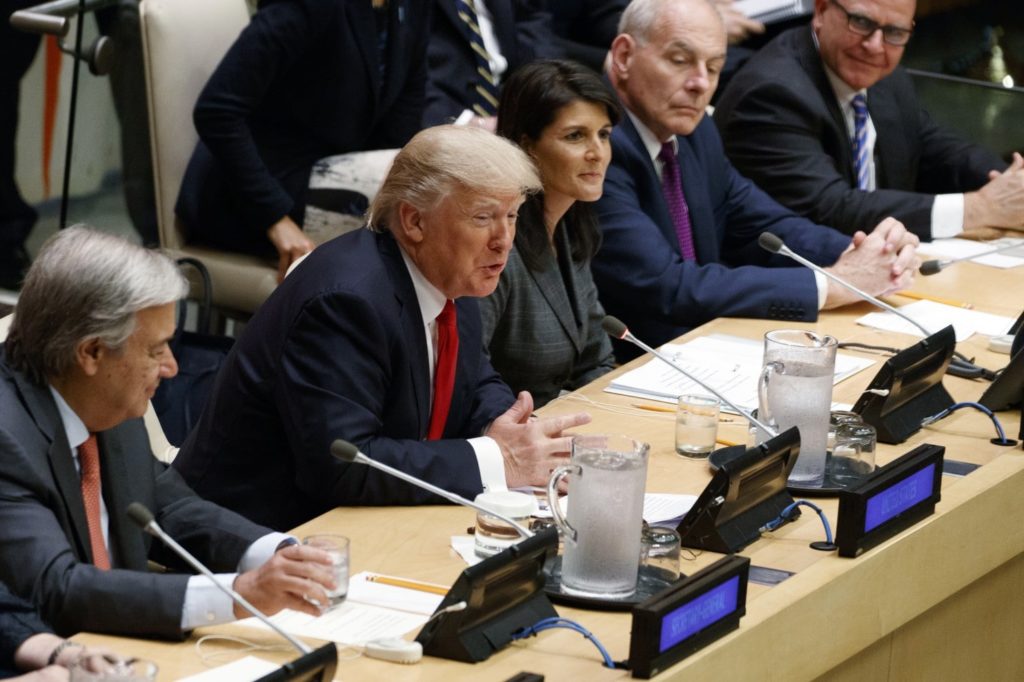
“Utter weakness and incompetence.” ”Not a friend of democracy.” ”Just a club for people to get together, talk and have a good time.” As President Donald Trump visits the United Nations, a look at some of his past tough comments about the world body: – “Why is the UN condemning @Israel and doing nothing about Syria? What a disgrace,” he tweeted in October 2011, one of a series of tweets about the organization that year. Trump said that September he was “increasingly concerned” with what he called “the UN’s ploy against @Israel this coming week.” “We must stand firm against the UN’s ploy to sabotage Israel — -if the UN grants the PA statehood then we must immediately defund it,” he wrote. – “The cheap 12 inch sq. marble tiles behind speaker at UN always bothered me. I will replace with beautiful large marble slabs if they ask me,” he tweeted in October 2012. – In a speech at the AIPAC Policy Conference in Washington in March 2016, Trump took on what he described as “the utter weakness and incompetence of the United Nations.” “The United Nations is not a friend of democracy, it’s not a friend to freedom, it’s not a friend even to the United States of America; whereas you know it has its home and it surely is not a friend to Israel,” he said. -Angry at the Obama administration for not vetoing a U.N. resolution that criticized Israel for its settlement activity, the soon-to-be-president said in a Dec. 23, 2016 tweet that: “As to the U.N., things will be different after Jan. 20th.” -“The United Nations has such great potential but right now it is just a club for people to get together, talk and have a good time. So sad!” Trump tweeted on Dec. 26, 2016, shortly before his move to Washington. – “The U.N. has such tremendous potential, not living up to its potential,” he told reporters at his Mar-a-Lago resort in Florida in December 2016. “When do you see the United Nations solving problems? They don’t. They cause problems. So, if it lives up to the potential, it’s a great thing. And if it doesn’t, it’s a waste of time and money.” -“I have long felt the United Nations is an underperformer but has tremendous potential,” Trump told ambassadors and their spouses who visited the White House for lunch in April. “I think that the United Nations has tremendous potential – tremendous potential – far greater than what I would say any other candidate in the last 30 years would have even thought to say. I don’t think it’s lived up – I know it hasn’t lived up to the potential.” He added: “You just don’t see the United Nations, like, solving conflicts. I think that’s going to start happening now. I can see it. And the United Nations will get together and solve conflicts. It won’t be two countries, it will be the United Nations mediating or arbitrating with those countries. So I see fantastic potential.” Republished with permission from the Associated Press.
Donald Trump, in U.N. debut, urges the world body to reform

President Donald Trump made his debut at the United Nations on Monday, using his first moments at the world body to urge the 193-nation organization to reduce bureaucracy and costs while more clearly defining its mission around the world. But while Trump chastised the United Nations – an organization he sharply criticized as a candidate for president for its spiraling costs – he said the United States would “pledge to be partners in your work” in order to make the U.N. “a more effective force” for peace across the globe. “In recent years, the United Nations has not reached its full potential due to bureaucracy and mismanagement,” said Trump, who rebuked the United Nations for a ballooning budget. “We are not seeing the results in line with this investment.” The president pushed the U.N. to focus “more on people and less on bureaucracy” and to change “business as usual and not be beholden to ways of the past which were not working.” He also suggested that the U.S. was paying more than its fair share to keep the New York-based world body operational. But he also complimented steps the United Nations had taken in the early stages of the reform process and made no threats to withdraw his nation’s support. His measured tone stood in stark contrast to his last maiden appearance at a global body, when he stood at NATO’s new Brussels headquarters in May and scolded member nations for not paying enough and refusing to explicitly back its mutual defense pact. While running for office, Trump labeled the U.N. as weak and incompetent, and not a friend of either the United States or Israel. But he has softened his tone since taking office, telling ambassadors from U.N. Security Council member countries at a White House meeting that the U.N. has “tremendous potential.” Trump more recently has praised a pair of unanimous council votes to tighten sanctions on North Korea over its continued nuclear weapons and ballistic missile tests. Trump’s big moment comes Tuesday, when he delivers his first address to a session of the U.N. General Assembly. The annual gathering of world leaders will open amid serious concerns about Trump’s priorities, including his policy of “America First,” his support for the U.N. and a series of global crises. It will be the first time world leaders will be in the same room and able to take the measure of Trump. The president on Monday praised U.N. Secretary-General Antonio Guterres, who also spoke at the reform meeting and said he shared Trump’s vision for a less wasteful U.N. to “live up to its full potential.” The U.S. has asked member nations to sign a declaration on U.N. reforms, and more than 120 have done so. The president also kicked off his maiden speech at the world body by referring to the Trump-branded apartment tower across First Avenue from the U.N. Nikki Haley, the U.S. ambassador to the U.N., said Trump’s criticisms were accurate at the time, but that it is now a “new day” at the U.N. An organization that “talked a lot but didn’t have a lot of action” has given way to a “United Nations that’s action-oriented,” she said, noting the Security Council votes on North Korea this month. Guterres has proposed a massive package of changes, and Haley said the U.N. is “totally moving toward reform.” Trump riffed on his campaign slogan when asked about his main message for the General Assembly. “I think the main message is ‘make the United Nations great.’ Not again, ‘make the United Nations great,’” Trump said as he left the U.N. building. “Such tremendous potential, and I think we’ll be able to do this.” Trump also planned separate talks Monday with Israeli Prime Minister Benjamin Netanyahu and French President Emmanuel Macron. U.S. national security adviser H.R. McMaster said “Iran’s destabilizing behavior” would be a major focus of those discussions. He also was having dinner with Latin American leaders. The United States is the largest contributor to the U.N. budget, reflecting its position as the world’s largest economy. It pays 25 percent of the U.N.’s regular operating budget and over 28 percent of the separate peacekeeping budget – a level of spending that Trump has complained is unfair. The Trump administration is conducting a review of the U.N.’s 16 far-flung peacekeeping operations, which cost nearly $8 billion a year. Cutting their costs and making them more effective is a top priority for Haley. Republished with permission from the Associated Press.
Pushing back on Israel, John Kerry defends Obama Admin’s UN vote
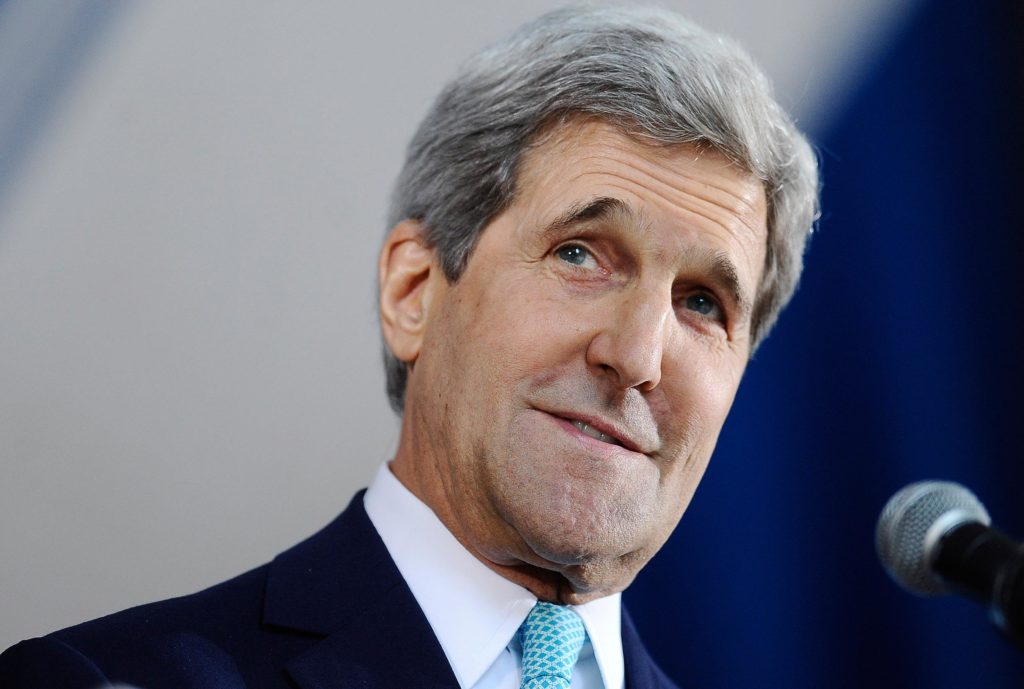
Stepping into a raging diplomatic argument, Secretary of State John Kerry on Wednesday staunchly defended the Obama administration’s decision to allow the U.N. Security Council to declare Israeli settlements illegal and warned that Israel’s very future as a democracy is at stake. Kerry, pushing back on Israel’s fury at the U.S. abstention of the United Nations vote, questioned Prime Minister Benjamin Netanyahu‘s true commitment to Palestinian statehood, which has formed the basis for all serious peace talks for years. Though Netanyahu says he believes in the two-state solution, Kerry said, he’s at the helm of the most right-wing (government) in Israel’s history. “If the choice is one state, Israel can either be Jewish or democratic, it cannot be both, and it won’t ever really be at peace,” Kerry said. Kerry’s speech marked the latest escalation in a vicious, drama-filled row between the U.S. and Israel that has erupted in the last days of Obama’s administration. The extraordinary display of discord between allies – with U.S. and Israeli officials openly disparaging each other – has also pitted President Barack Obama against President-elect Donald Trump, who has firmly taken Netanyahu’s side. Israel’s government was enraged after the U.S. abstained from voting on the U.N. Security Council resolution last week that called Israeli settlements in the West Bank and east Jerusalem a violation of international law. Netanyahu accused the U.S. of colluding with the Palestinians and helping draft the resolution, charges the U.S. has denied. “The United States did in fact vote in accordance with our values, just as previous administrations have done,” Kerry said in a farewell speech at the State Department. “The vote in the United Nations was about preserving the two-state solution. That’s what we were standing up for.” Kerry reiterated that the Obama administration’s commitment to Israel was as strong as that of previous presidents, but he also noted that previous U.S. administrations had also abstained on certain resolutions critical of Israel. He emphasized the record levels of military assistance the U.S. has provided Israel under Obama, codified by a 10-year aid deal recently struck worth $38 billion. “No American administration has done more for Israel’s security than Barack Obama’s,” Kerry said. Obama, who is vacationing with his family in Hawaii, hasn’t commented publicly on the resolution or the resulting spat. Seeking to show he wasn’t focusing exclusively on Israel’s failings, Kerry in the same sentence bemoaned Israel’s “seemingly endless occupation” of Palestinian land and Palestinian leaders’ “incitement” of violence. He invoked the widespread concern that the growing Arab population will eventually make Jews a minority in Israel, creating a democratic crisis for Israel unless there’s a separate Palestinian state. Israeli leaders have made no secret that they are counting on Trump to change U.S. policy, and Trump assured them hours before Kerry’s speech that they just needed to “hang on” til Jan. 20, when he would be sworn in as president. While Trump has not outlined a vision, he has signaled a much more sympathetic approach toward Israel, appointing an ambassador with strong ties to the West Bank settler movement and promising to move the U.S. Embassy from Tel Aviv to Jerusalem over Palestinian and others’ objections. “President-elect Trump, thank you for your warm friendship and your clear-cut support for Israel,” Netanyahu said on Twitter before Kerry’s speech. A senior Israeli Cabinet minister, Gilad Erdan, on Wednesday called Kerry’s speech a “pathetic step,” before Kerry even began speaking. The international community overwhelmingly opposes Israeli settlement construction in the West Bank and east Jerusalem, territories captured by Israel in 1967 and claimed by the Palestinians for an independent state. The Palestinians, and most of the world, see settlements, now home to 600,000 Israelis, as an obstacle to peace. Republished with permission of the Associated Press.
Israeli Cabinet minister calls John Kerry speech a ‘pathetic’
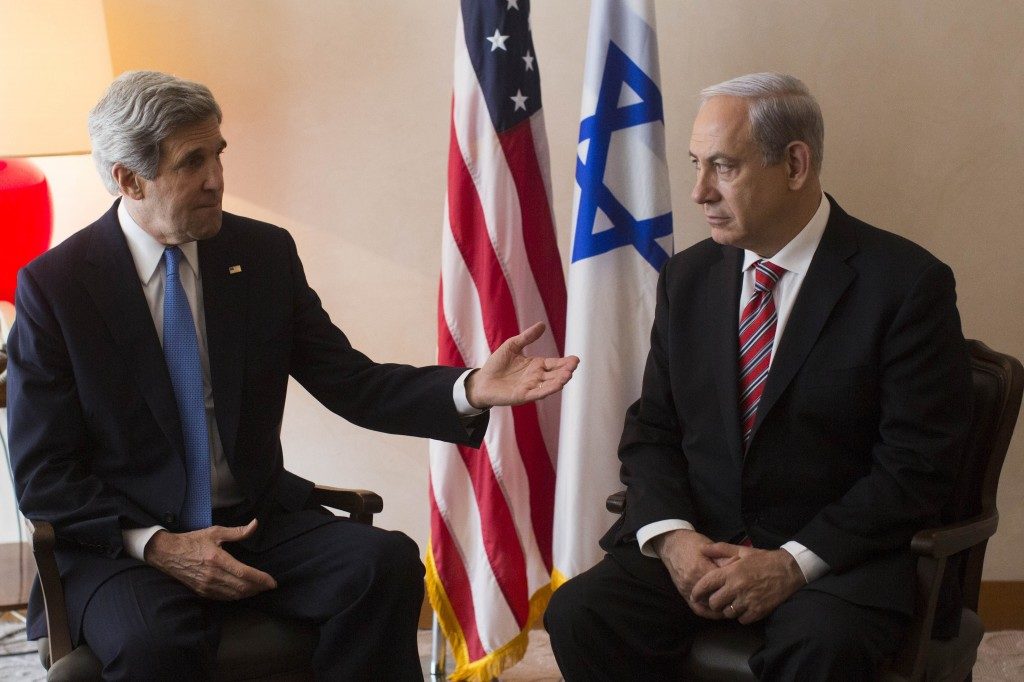
A senior Israeli Cabinet minister on Wednesday called U.S. Secretary of State John Kerry‘s planned Mideast policy speech a “pathetic step,” further heightening tensions between the two close allies as the Obama administration prepares to leave office. The comments by Public Security Minister Gilad Erdan were the latest salvo in a toxic exchange following the U.S.’s refusal to veto a U.N. Security Council resolution last week that called Israeli settlements in the West Bank and east Jerusalem a violation of international law. Israeli Prime Minister Benjamin Netanyahu has slammed the resolution, and accused the U.S. of colluding with the Palestinians in drawing it up. Following up on the U.N. resolution, Kerry was scheduled to deliver a farewell speech in Washington on Wednesday to outline his proposals for a peace settlement between Israel and the Palestinians. Next month, France is set to host an international conference where 70 countries, over Israeli objections, hope to endorse an international framework for Mideast peace. Israeli officials fear that the conference’s recommendations may then be approved in another U.N. Security Council resolution just before Obama leaves office on Jan. 20. In a radio interview, Erdan said Kerry’s speech was part of a broader effort to hinder the incoming administration of Donald Trump, who has signaled he will have much warmer relations with Israel. “This step is a pathetic step. It is an anti-democratic step because it’s clear that the administration and Kerry’s intention is to chain President-elect Trump,” Erdan told Israel Army Radio. Erdan, a member of Netanyahu’s Likud Party and inner Security Cabinet, said Obama administration officials are “pro-Palestinian” and “don’t understand what’s happening in the Middle East.” Kerry mediated a nine-month round of peace talks that broke down in early 2014 with little progress. Israeli leaders have made no secret that they are counting on Trump to change U.S. policy. While Trump has not outlined a vision, he has signaled a much more sympathetic approach toward Israel, appointing an ambassador with strong ties to the West Bank settler movement and promising to move the U.S. Embassy from Tel Aviv to Jerusalem, over Palestinian objections. The international community overwhelmingly opposes Israeli settlement construction in the West Bank and east Jerusalem, territories captured by Israel in 1967 and claimed by the Palestinians for an independent state. The Palestinians, and most of the world, see settlements, now home to 600,000 Israelis, as an obstacle to peace. Netanyahu says the conflict with the Palestinians, including the fate of the settlements, must be resolved through direct negotiations and says that international dictates undermine the negotiating process. Despite the Israeli anger, Netanyahu ordered a Jerusalem planning committee to delay a vote on approving construction of some 500 new homes in Jewish developments of east Jerusalem, a city councilman said. Council member Hanan Rubin told The Associated Press that Netanyahu asked to delay Wednesday’s vote so as not to antagonize relations with the U.S. Meanwhile, a senior leader of the West Bank settlement movement called Kerry a “stain on American foreign policy” and “ignorant of the issues.” Oded Revivi, chief foreign envoy of the Yesha Council, said Kerry is “the worst secretary of state in history,” who “chose to stab his closest ally in the back” and knows little about the realities of Israeli settlements in the West Bank. Republished with permission of the Associated Press.
Israel accuses Barack Obama of anti-Israeli ‘shameful move’ at UN
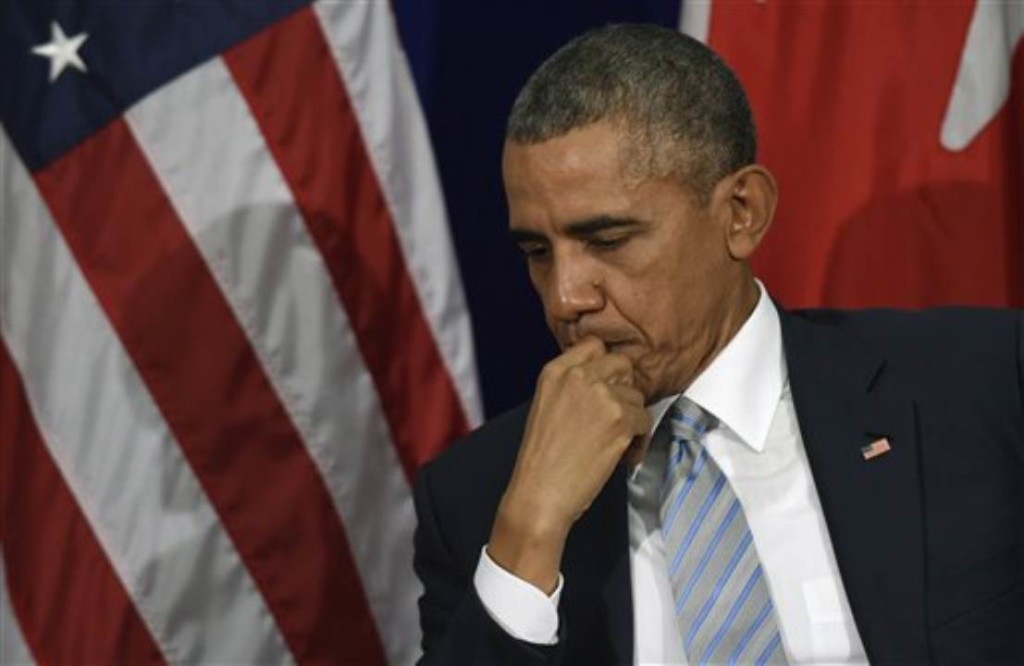
An Israeli official on Friday accused President Barack Obama of colluding with the Palestinians in a “shameful move against Israel at the U.N.” after learning the White House did not intend to veto a Security Council resolution condemning settlement construction in the West Bank and east Jerusalem the day before. “President Obama and Secretary Kerry are behind this shameful move against Israel at the U.N.,” the official said. “The U.S administration secretly cooked up with the Palestinians an extreme anti-Israeli resolution behind Israel’s back which would be a tail wind for terror and boycotts and effectively make the Western Wall occupied Palestinian territory,” he said calling it “an abandonment of Israel which breaks decades of US policy of protecting Israel at the UN.” Earlier he said Israel’s prime minister turned to President-elect Donald Trump to help head off the critical U.N. resolution. Although the U.S. opposes the settlements, it has traditionally used its veto power as a permanent member of the Security Council to block resolutions condemning Israel, saying that disputes between Israel and the Palestinians must be resolved through negotiations. But after eight years of failed peace efforts during the Obama Administration, Israel has expressed concern the outgoing president would take an audacious step to leave his mark on the region. In recent weeks, the White House had been especially secretive about its deliberations. The Israeli official’s admission marked a final chapter in the icy relations between Prime Minister Benjamin Netanyahu and President Barack Obama over the last eight years, and signaled an era of close ties between Israel and the incoming Trump administration. The Egyptian-sponsored resolution had demanded that Israel halt settlement activities in occupied territories claimed by the Palestinians and declared that existing settlements “have no legal validity.” But under heavy Israeli pressure, Egypt called off a planned vote in the Security Council hours before it was to take place. In the diplomatic activity ahead of the postponement, both Netanyahu and Trump issued nearly identical statements urging the U.S. to veto the measure. “After becoming aware that the administration would not veto the anti-Israel resolution, Israeli officials reached out to Trump’s transition team to ask for the president-elect’s help to avert the resolution,” the Israeli official said, speaking on condition of anonymity because he was discussing behind-the-scenes diplomatic activity. On Friday, Egypt said its president had received a call from Trump in which they both agreed to give the incoming U.S. administration a chance to try and resolve the Israeli-Palestinian conflict. The call came hours after Egypt indefinitely postponed the U.N. vote. A statement from the Egyptian presidency said the two men spoke by phone early Friday and agreed on “the importance of giving a chance for the new American administration to deal in a comprehensive way with the different aspects of the Palestinian issue with the aim of achieving a comprehensive and a final resolution.” A senior Palestinian official, speaking anonymously according to protocol, said Egypt didn’t consult with the Palestinians about delaying the vote and it was a “complete shock” for them. Egypt represents Arab states on the security council. Egypt is the first Arab country to make peace with Israel, and the two countries have close security ties in a shared struggle against Islamic militants. He said attempts are still underway to bring the resolution to vote after Egypt called it off as there are still several other sponsors- Venezuela, Malaysia, Senegal and New Zealand – that could present it. The U.S., along with the Palestinians and nearly all of the international community, opposes Israeli settlements in the West Bank and east Jerusalem as obstacles to peace. Some 600,000 Israelis live in the two territories, which the Palestinians seek as part of a future independent state. Israel captured both areas in the 1967 Mideast war. Trump has signaled he will be far more sympathetic to Israel. His campaign platform made no mention of the establishment of a Palestinian state, a core policy objective of Democratic and Republican presidents over the past two decades. He also has vowed to move the U.S. Embassy from Tel Aviv to Jerusalem, a move that would put the U.S. at odds with the Palestinians and almost the entire remainder of the international community, and his pick for ambassador to Israel, Jewish-American lawyer David Friedman, is a donor and vocal supporter of the settlements. The proposed resolution would have been more than symbolic. While it did not call for imposing sanctions on Israel, its language could have hindered Israel’s negotiating position in future peace talks. Given the widespread international opposition to the settlements, it would have been nearly impossible for the Trump administration to reverse it. It remained unclear Friday whether the measure would come up for a vote in the council before Obama leaves office. In a Christmas greeting on Friday, Palestinian President Mahmoud Abbas said: “Despite the Israeli occupation, our presence in our homeland and the preservation of our cultural and national heritage are the most important form of resistance in the face of the darkness of a foreign colonialist occupying power.” Republished with permission of the Associated Press.


